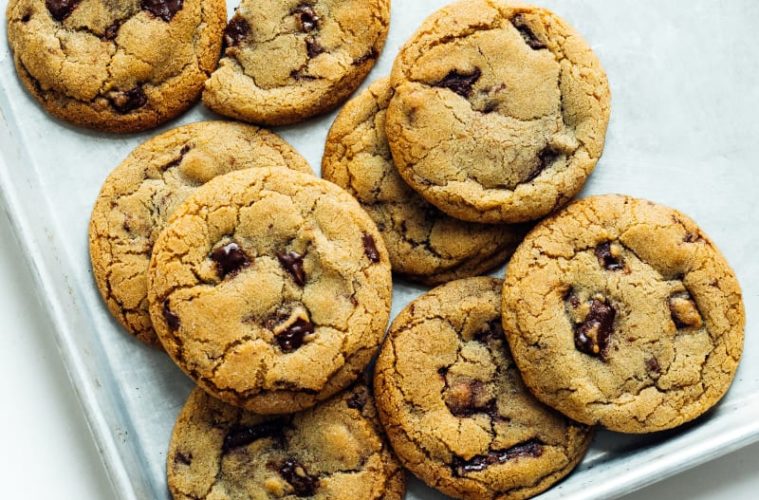Before his new adventures in cannabis and climbing the mountain to become The Emerald Cup Champion with weed cookie dough, longtime Los Angeles resident Kevin Harris spent 20 years in television.
As a young man, Harris started working at an accounting firm in Seattle after college. He began filing taxes for a casting agent that helped with a lot of commercials in Seattle back in the day. One time, when signing some paperwork, he took a look at Harris and recommended he come read for a commercial he was casting for the popular seafood restaurant Skippers.
Skippers is the biggest local seafood chain in the Seattle area. Harris got a kick out of the idea and went to read to play Skipper in the commercials. He got the part. He essentially served as Skippers’ spokesman for a few commercials. The best part was getting his toes wet in the entertainment business.
Harris didn’t stick around Seattle long. He moved to L.A. in the mid-1990s and has called it home since.
“That led me to the television business,” Harris told L.A. Weekly, “I left the accounting firm and started doing accounting in the film business. Then I transitioned into television and ended up showrunning a bunch of non-scripted documentaries like The Apprentice, Top Gear, American Chainsaw, a bunch of them. And then in 2016, when Donald decided he wanted to run for president, we shut down at that point.”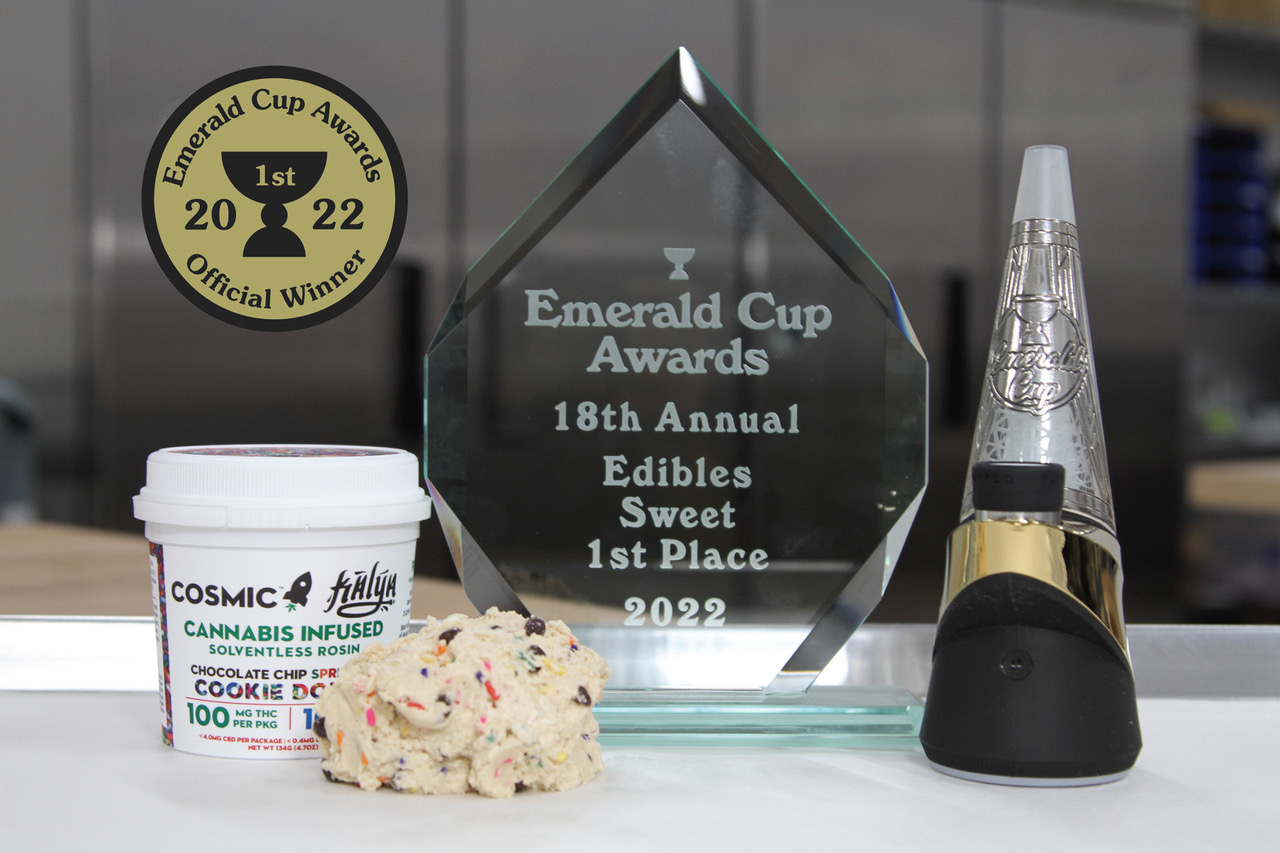
During those early days in L.A., he’d also have a front-row seat to California’s transition to medical cannabis after Prop 215 passed in 1996. He would find his way into a Venice dispensary around 2010. That’s where he would buy my mom’s gummies three or four years later after first having access to a dispensary, and that’s when he decided to make her something better to help her battle with breast cancer.
“The gummies weren’t the best. There was lots of sugar and artificial flavors,” Harris said. “She was battling breast cancer, I didn’t need to feed her with a bunch of artificial stuff. So that’s what I thought, let me find something else. Just gravitated towards the bookcase because I’d already always made my grandma’s cookies for the family and friends, over 30 years I’ve been making those cookies.”
Helping Mom
As Harris helped his mom in the midst of the tail-end of his run with The Apprentice, he wanted to figure out a way to make medical cannabis a palatable option for his mom and the cookies won, but there was much work to do.
“I decided to do it because my mother was very familiar with those. And they were her mother’s recipe, so I thought it would just make the fight even better for her,” Harris said.
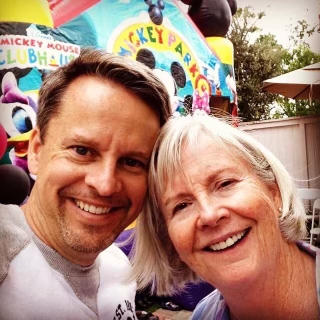
Harris with his mom.
Harris next took the further step of making grandmother’s recipe vegan, so mom would have no problem eating them every day. He struggled with the idea at first thinking it would be impossible or they would be judged against the original’s deliciousness.
“I just kind of started messing with it. Some friends that were vegan told me there were some really good alternatives that had come to market,” Harris said. “A lot of it’s exactly the same, they just don’t use bone fragments to break up the sugar and stuff like that.”
Harris went on to break down his own relationship with cannabis prior to helping his mom out. While he would dabble in college, being an NCAA athlete running track at Western Washington University made it tricky. He’d come across the occasional joint but didn’t feel like part of his world in the way it did when he got to California. He guesstimates he’s been a daily user for about 15 years now. I can attest, we smoked a cannon of Zoap together the last time we linked up. Harris puffs tough.
Founding Cosmic
Two years after that first batch for mom, Harris would make the first medical batch for the Prop 215 market after founding Cosmic Edibles in 2016. It was exclusively cookies. Mom was a big supporter, and at that point, in better health. Family and friends participated in the early funding round leaving Harris to serve as founder and operating partner.
But he wasn’t all in. After working on The Apprentice from 2004 to 2016, he’d built too much to toss it away for a weed cookie dream at that point. Furthermore, he always planned on taking the turtle approach. Moving slowly would make it easier to survive the emerging market. 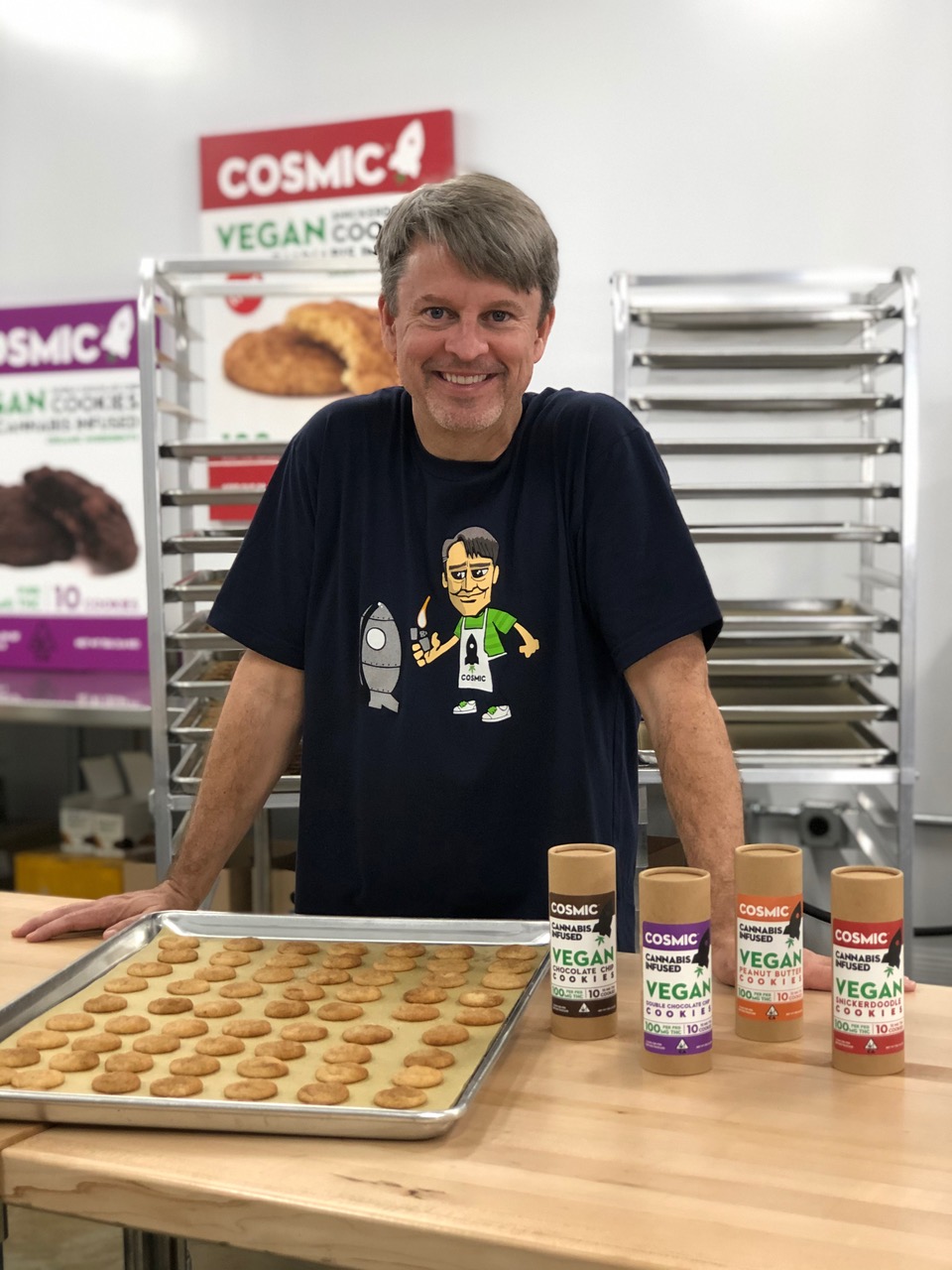
“I wanted to be able to keep up with it. And we wanted to be able to last as long as possible. You know, I did know from my economic days that emerging markets are all about lasting,” Harris said. “The longer you can make it, the better off you’ll be.”
The business plan was lean and mean. Harris believes that was what helped the most as Cosmic survived the peaks and valleys of cannabis in California after legalization. When times are good, they’re great, but even when they haven’t been, it hasn’t forced the company to close shop like so many of its peers.
Harris does admit the leanness of the operation was conducive to the pacing of the growth. They wouldn’t have been able to double the size of the operation in a month. Nevertheless Cosmic continues to grow, Harris estimated they’re in about 10% of the state’s dispensaries. Sometimes he even makes the drops himself. Part of the leanness is that everyone at Cosmic does everything. Well, almost everything; every batch of cookie dough the company has ever produced to package or put into cookies was mixed personally by Harris.
Times are weird in the world. We asked Harris how sturdy the supply chain is around the quality of products he wants to work with. When replying, he explained the amount of time he spends researching those kinds of things, as he brings new flavors to market.
“I’m really doing my homework to make sure that we can do it in big quantities and we can do it for an extended period of time,” he replied. “So I make sure that I have multiple sources for the ingredients that I use.”
Harris finds it interesting that there’s no regulatory body on the word vegan.
“There’s nobody saying you have to do X, Y, and Z,” he laughed. “Vegans are the ones regulating that word; it’s the community, which is wild.”
Harris hired a food scientist to make sure he would not face the communities’ wrath. He said the most expensive day was $3,000, but he was convinced that day alone had saved him $100,000 in headaches.
“I was all ears and absorbing everything,” Harris said. “I saw it as $3,000 now and avoid all these pitfalls that I could run into along the way, and he’s gonna save me from basically learning the hard way.
Navigating Los Angeles
Cosmic started production in Manhattan Beach; Harris would spend the next year searching for a viable location in Los Angeles. He couldn’t find anything. When brokers would find somewhere, it would be extremely dilapidated and they’d promise to clean up the glass and get the homeless folks out before he moved in.
“I was almost giving up because I was just, man this is ridiculous. Because the rents were astronomical for basically a teardown,” Harris said.
Eventually, they’d find their home in Los Angeles despite some very tempting offers from Long Beach. Construction started in 2017. Harris argues the eight months it took him to get all his licensing in order blew people away. Even if manufacturing permits without volatile gasses attached to them are generally quicker than cultivation and retail, Harris pulled it off at breakneck speed.
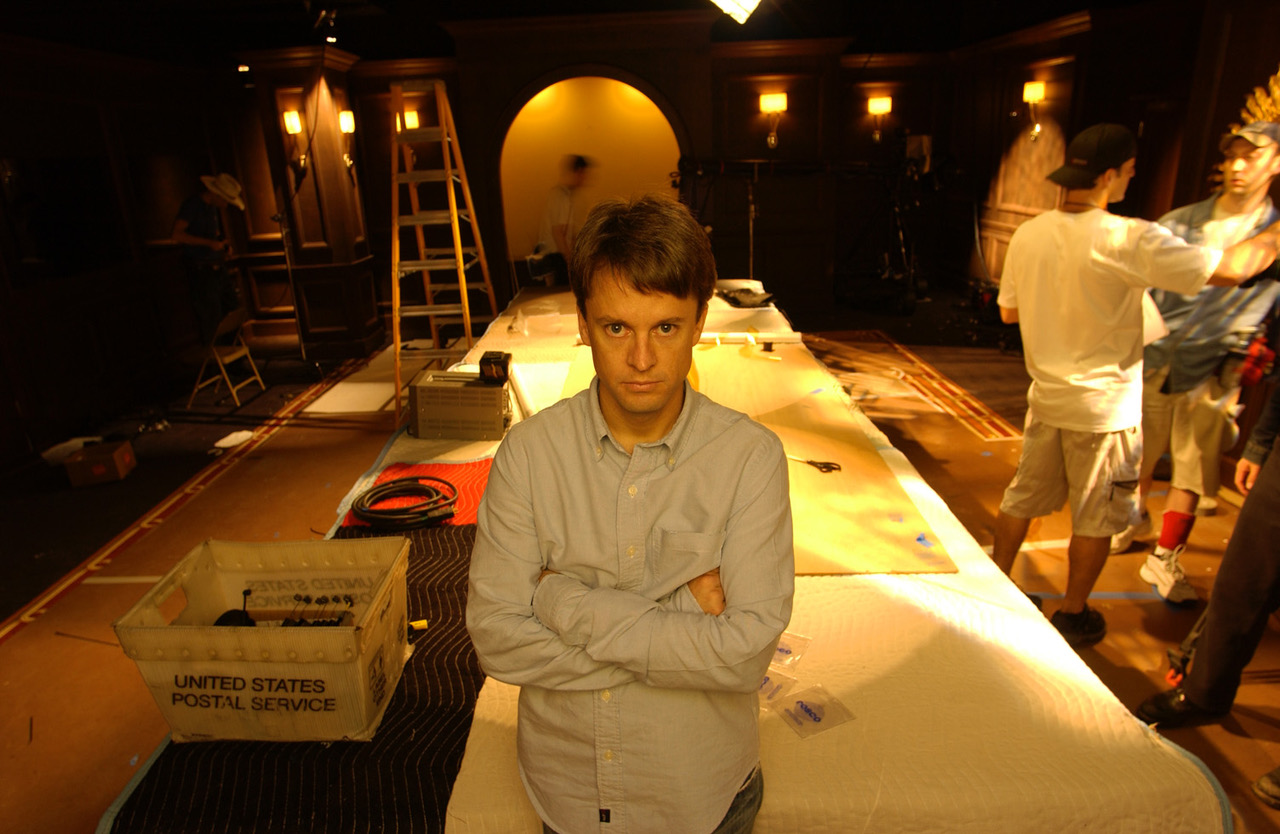
Harris building The Apprentice boardroom in 2003. Photo: Kevin T. Gilbert .
He said there were two main things that allowed him to fast-track everything. First was the kitchen consultant he brought in.
“I hired a kitchen consultant who does restaurants. He works with the health department to navigate the permitting process for you,” Harris said. “You pay them a fee and they basically designed it all to get all the plans approved for you, oversee inspections. You still have to hire the contractors.”
The facility was now a fully licensed commercial kitchen. When the city came out to license him for cannabis stuff, they were looking at a health department-permitted kitchen. Turning the location into a cannabis manufacturer proved swift.
But the risk of not getting the permit was always there. Harris would have just ended up with a kitchen instead of a cannabis company. This was also the biggest risk he took in picking L.A. over Long Beach. Long Beach had essentially guaranteed him a permit.
Coming from entertainment, he also was stunned at the level of regulatory oversight throughout the whole process.
“It’s unbelievable. They come in, check on you, look for problems,” Harris emphasized. “I have lost a lot more sleep to that than probably in the whole process of building it out, making products, making them great packaging and all that stuff.”
But he was approved in the end. Harris said grossly underestimated the amount of oversight they would face, but noted he also grossly underestimated how sales would go.
The Differences between Showbiz and Cannabis
Now that he’s deep into his cannabis adventure, we asked Harris what the biggest differences were in dealing with people in the entertainment industry and cannabis?

Harris and Donald Trump on the set of The Apprentice.
He spoke on the question from the perspective of launching a production company and the competitive bloodbath that comes with it compared to the more chill atmosphere of showrunning.
“When I was showrunning, like The Apprentice, it was a much easier process because they would just hire me to run their show,” Harris said. “I basically got to the point where I was doing my own ideas, and selling them and owning them. But that part of it was much harder when I was in competition with all those other producers selling ideas.”
Harris felt like you’d put a year of time into those projects before you’d find out if you’d make any money.
“If you pitched 20 projects, you might have interest in one or two of them. And of those, one or two you might get one of them into a pilot,” Harris said. “If you’re doing about one pilot per 20 pitches, you’re doing pretty good.”
Over about four years, Harris would get a full series order and 12 pilots. He realized he could make a lot more money tapping other people’s projects into his network than showrunning.
Spinning Plates
Harris emphasized how hard it would be to say goodbye to showbiz completely after dedicating so much of his life to it.
“I haven’t let it go because I had such a reputation that I had the ability to pinch anywhere in town,” Harris said. “I can call almost any of the network executives soft pitching ideas. So it’s the thing that I built up for 20 years that I didn’t necessarily want to just let go of… And in the time period in the five years that we’ve been operating Cosmic, I’ve sold two projects during that time.”
Harris spoke of the dopest idea to recently fall in his lap. It’s about a gay American couple who packed up everything to move to France, rebuild a Chalet, and turn it into a bed and breakfast.
“They’re going to do me a little tour video walking around telling you what they’re going to do to the property,” Harris said. “Then I’m going to take that and I’ve already talked to HGTV about it.”
Even though weed cookie dough is dope and he loves trophies, TV is attached to his DNA at this point. He can’t deny his primal urges. He can’t let that stuff go. Because when he sees an idea that he thinks should be on television, he can’t stop thinking about it. 
But the rise of Cosmic continued. As the company grew, he would only be able to dedicate so much of himself to television production compared to years past.
“There was a moment, I would put it in somewhere around 2017, that I was still kind of doing both jobs full-time,” Harris said. “And I got to a point in 17 where I literally had to take one foot off the dock and jump into the boat because the boat in the dock separated too far away for me to do both.”
So while he left the day-to-day aspects of things like building boardrooms and front lighting, he was never all the way out.
Multistate Cookie Dough
Cosmic has room to grow at home, but the company will be on both coasts in the not-too-distant future. They’re already working with a manufacturer in Massachusetts, they’re also now eyeing a deal in Michigan. They would come in and set everything up for their out-of-state partners, who would then just run it like a franchise.
“We go in, train them, give them all the keys to the kingdom, get all the packaging, set up the same operation there and they operate it,” Harris said.
Look for Cosmic Edibles at a dispensary near you.
Advertising disclosure: We may receive compensation for some of the links in our stories. Thank you for supporting LA Weekly and our advertisers.

